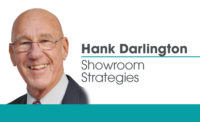How to conduct a winning interview

Your showroom’s most important asset is its people. Finding, growing and maintaining really good people are the keys to success.
There also are five things you must do to achieve that level of having good employees that can, and will make you the best business in your geographic area.
Repeat after me: Hire the best; Train the best; Motivate the best; Communicate the best; and Compensate the best.
In my opinion, the most important part of hiring the best is the interview process. A longtime client of mine recently interviewed a gentleman I’ve recommended to be the general manager of her showroom business.
In order to help the showroom owner in the interview process I sent her a fairly lengthy list of potential questions she might ask during the interviewing sessions. The questions and answers should provide major insight into the candidate’s fit with the owner’s expectations and company culture. It is important both parties learn all they can about each other. My client’s goal is to get a good understanding of what will motivate and engage the prospective general manager to ensure his success and longevity with the organization.
I helped my client write a comprehensive general manager’s job description and then formatted what I believe would be an attractive compensation package. I also formatted a series of questions the owner might ask the prospect that I believe would ensure getting the best insights into the candidate’s character, potential strengths and possible limitations. Sharing these questions with you will help you conduct better interviews and make better hiring decisions.
While I’m going to list a variety of questions, you would only ask those that would be most relevant to your circumstances. A typical interview may take between 45 minutes and two hours, so I would urge you to ask a wide range of questions during the course of the interview. Here are some quick tips to help ensure interviewing success.
Make the candidate feel comfortable: Allow time for general conversation that helps you and the candidate to get to know one another beyond the structured questions.
Use a range of interview questions and techniques: Basic, behavioral and situational questions should be utilized to gain a comprehensive understanding of the candidate’s experience and fit for the position.
Keep the questions consistent: If there is more than one candidate for the position, ask the same questions to ensure fairness — and interview them within a short period of time.
Listen and watch carefully: A large portion of communication is nonverbal. Pay attention to facial expression and body language. Remember, skills can be taught, while attitude and willingness cannot.
Consider the candidate’s interviewing experience: If your candidate has only had two jobs in the past 15 years, chances are they may not be the best interviewee, but taking into account their loyalty, they very well might make a great employee.
Basic interview questions are straightforward and require defined, concise responses by the candidate. Here are some basic questions that will tell you a bit about their skills, experience and cultural fit.
Understanding the candidate’s overall perception of themselves:
- Tell me about yourself.
- What are your strengths?
- What are your weaknesses?
- What are your top three or four motivators?
- What demotivates you?
- Why do you think you’d be a good fit for this job?
Understanding the candidate’s interest in and knowledge of the industry, the company and what their role would be:
- What do you know about our company?
- What do you know about the DPH industry?
- What trends do you think might be affecting our business?
- What attracted you to our company?
- Why do you want this job? Gauge their enthusiasm when answering these questions.
Understanding successes and identifying limitations from their past work experiences:
- When were you most satisfied with your job?
- What were the responsibilities of your last position?
- What did you like least about your last job?
- Why are you leaving (or left) you present job?
Understanding the candidate’s future aspirations, desired working environment and motivation to achieve their goals. Compare their goals to the goals of your company.
- What would be your ideal company and/or job?
- Where would you like to be in your career five years from now?
- Where do you see yourself in 10 years?
- If you were to start your own business in the future, what would it be?
Test the candidate’s self-confidence and ability to “sell” you on hiring them:
- Why should we hire you?
- What can you do for us that other candidates can’t do?
- What makes you unique?
Evaluating what your candidate’s salary expectations are and what their future earning potential is:
- What salary are you seeking?
- What is your salary history?
- If I were to pay you the salary you have requested and asked you to write your own job description for the next year, what would it say?
Always stop periodically and ask the candidate what questions they may have for you. This could give you some insight into the candidate’s prior research, any hesitations they might have and which areas have importance and value to them.
Then, of course, you should be prepared for what questions the candidate may ask you. Such as:
- What do you enjoy most about working here?
- What don’t you like about working here? What would you change if you could?
- Why is this position open?
- Why should I choose to work here over other opportunities?
- How would I be supervised and evaluated to ensure my success in this position?
- Skills and experience aside, what qualities would make me successful in this role?
- Are there any factors that you think would limit my capability in this role that I could improve on?
- What are the next steps in the interview process?
Here are some additional behavioral questions you might ask to access the candidate’s suitability for this particular job:
- What was the last project you led and what was the outcome?
- What was your greatest failure and what did you learn from it?
- Have you had any assignment that was difficult for you and how did you resolve it?
- Give me an example of a time that you felt you went above and beyond “the expected” at work?
- Tell me about a task that required you to be a self-starter. What was the result?
- Tell me about your most recent hectic day at work. How did you keep it under control?
- What examples can you give me that demonstrate your ability to meet deadlines and react to priorities?
- Tell me about a time when you faced an ethical dilemma. How did you handle it?
- Have you ever been on a team where someone was not pulling their own weight? How did you handle it?
- We have all had to work with someone who was difficult to get along with. Give me an example of when this happened to you and how you handled it.
- If I was your supervisor and asked you to do something you disagreed with, what would you do?
- What traits irritate you about other people and how do you deal with those?
- Describe a situation in which you and a coworker/client were in conflict with each other. What did you do to resolve it and what was the outcome?
The interviewing process is one of the most crucial phases of the hiring process. Proper preparation and structure can make a major difference in adding the right person to your team and insuring they will be there for the long haul.
Remembering tips for interview success and using a range of interview techniques will put you on the right path to building a successful team.
Good selling!
Looking for a reprint of this article?
From high-res PDFs to custom plaques, order your copy today!






